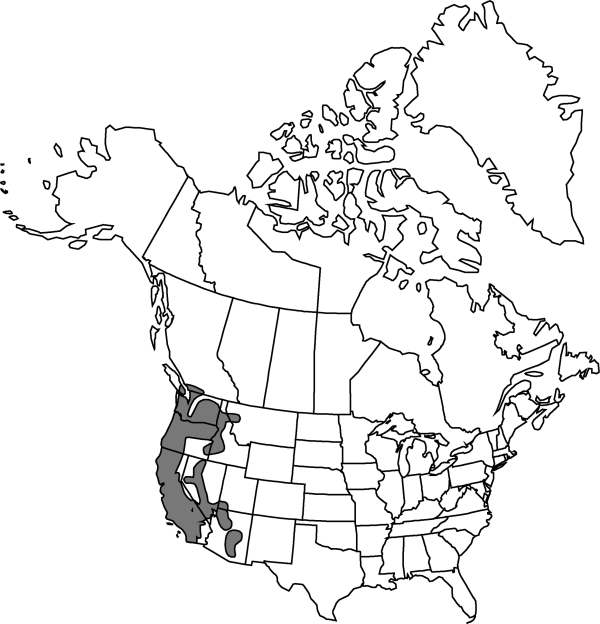Difference between revisions of "Claytonia parviflora"
Fl. Bor.-Amer. 1: 225, plate 73. 1832.
Common names: Indian-lettuce
IllustratedEndemic
Synonyms: Claytonia perfoliata var. parviflora (Douglas ex Hooker) Torrey Montia perfoliata var. parviflora (Douglas ex Hooker) Jepson
Treatment appears in FNA Volume 4. Mentioned on page 471.
FNA>Volume Importer |
imported>Volume Importer |
||
| Line 8: | Line 8: | ||
}} | }} | ||
|common_names=Indian-lettuce | |common_names=Indian-lettuce | ||
| + | |special_status={{Treatment/ID/Special_status | ||
| + | |code=F | ||
| + | |label=Illustrated | ||
| + | }}{{Treatment/ID/Special_status | ||
| + | |code=E | ||
| + | |label=Endemic | ||
| + | }} | ||
|basionyms= | |basionyms= | ||
|synonyms={{Treatment/ID/Synonym | |synonyms={{Treatment/ID/Synonym | ||
| Line 28: | Line 35: | ||
-->{{Treatment/Body | -->{{Treatment/Body | ||
| − | |distribution= | + | |distribution=B.C.;Ariz.;Calif.;Idaho;Mont.;Nev.;Oreg.;Utah;Wash. |
|discussion=<p>Subspecies 4 (4 in the flora).</p> | |discussion=<p>Subspecies 4 (4 in the flora).</p> | ||
|tables= | |tables= | ||
| Line 74: | Line 81: | ||
|basionyms= | |basionyms= | ||
|family=Portulacaceae | |family=Portulacaceae | ||
| − | |distribution= | + | |distribution=B.C.;Ariz.;Calif.;Idaho;Mont.;Nev.;Oreg.;Utah;Wash. |
|reference=None | |reference=None | ||
|publication title=Fl. Bor.-Amer. | |publication title=Fl. Bor.-Amer. | ||
|publication year=1832 | |publication year=1832 | ||
| − | |special status= | + | |special status=Illustrated;Endemic |
| − | |source xml=https:// | + | |source xml=https://bibilujan@bitbucket.org/aafc-mbb/fna-data-curation.git/src/bb6b7e3a7de7d3b7888a1ad48c7fd8f5c722d8d6/coarse_grained_fna_xml/V4/V4_938.xml |
|genus=Claytonia | |genus=Claytonia | ||
|species=Claytonia parviflora | |species=Claytonia parviflora | ||
Revision as of 23:21, 27 May 2020
Plants annual, with minute, tuberous bodies; periderm absent. Stems 5–30 cm. Leaves: blades green or pink, not glaucous; basal leaves petiolate, blade linear (sometimes filiform), narrowly lanceolate, spatulate, or rhombic, 1–15 × 0.5–1 cm; cauline leaves sessile, blade linear and 0.5–4 cm, or perfoliate and 10 cm or less diam. Inflorescences 1-bracteate; bract 0.5–15 mm, leaflike. Flowers 2–12 mm diam.; sepals 1.5–4 mm; petals white or pink, 2–8 mm; ovules 3. Seeds 1–2.5 mm diam., shiny and smooth or with low tubercles, not pebbly; elaiosome 1–3 mm. 2n = 12, 24, 36, 48.
Distribution

B.C., Ariz., Calif., Idaho, Mont., Nev., Oreg., Utah, Wash.
Discussion
Subspecies 4 (4 in the flora).
Selected References
None.
Lower Taxa
Key
| 1 | Cauline leaves distinct and linear or trullate or deeply cleft into 2 ovate segments | Claytonia parviflora subsp. viridis |
| 1 | Cauline leaves perfoliate or slightly cleft | > 2 |
| 2 | Basal leaf blades spatulate, 0.3-1 cm wide; desert ranges | Claytonia parviflora subsp. utahensis |
| 2 | Basal leaf blades filiform to linear, 0.05-0.5 cm wide; Sierra Nevada, interior valleys, coast | > 3 |
| 3 | Flowers 2-8 mm diam.; Sierra Nevada, interior valleys, coast | Claytonia parviflora subsp. parviflora |
| 3 | Flowers 10-12 mm diam.; Sierra Nevada foothills | Claytonia parviflora subsp. grandiflora |